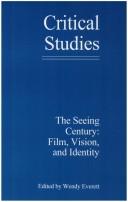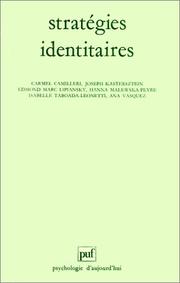| Listing 1 - 10 of 51 | << page >> |
Sort by
|
Book
Year: 1991 Publisher: Louvain-La-Neuve, Bruxelles: UCL,
Abstract | Keywords | Export | Availability | Bookmark
 Loading...
Loading...Choose an application
- Reference Manager
- EndNote
- RefWorks (Direct export to RefWorks)
-Une expérience réalisée par Diamond et Carey en 1986 et portant sur des tests de reconnaissance des visages en confrontation avec la reconnaissance d’autres stimuli a retenu notre attention.
- Une donnée qui a toujours intrigué les chercheurs dans les travaux menés quant à le reconnaissance des visages est la suivante : Alors que les visages sont toujours mieux reconnus que tous les stimuli auxquels ils sont confrontés aussi longtemps que la perception est en position normale (stimuli monorientés), cette performance s’inverse dès le moment où ils doivent être reconnus en position inversée (le haut devient le bas). Diamond et Carey ont voulu, vérifier cette donnée sur base d’un élément nouveau.
- Tenant compte du fait que chacun est « expert » en matière de reconnaissance des visages, Diamond et Carey se sont demandé si, dans le cas où l’objet de la comparaison avec les visages relevait d’une classe pour laquelle il existe des experts, les effets spécifiques de l’inversion seraient affectés par leur « expertise ». Ces auteurs ont voulu, par l’expérience menée à cet effet, vérifier l’influence de ce qu’ils ont appelé « l’effet d’expertise ».
- Les auteurs ont pu conclure que la mémoire de stimuli susceptible d’être soumis à expertise est aussi vulnérable à l’inversion que la mémoire des visages.
- Il nous a semblé intéressant de vérifier dans quelle mesure cette conclusion trouverait une confirmation à partir de l’extension de l’expérience à un matériel inédit.
De l’analyse des résultats que nous avons obtenus, une influence de l’effet d’expertise semble effective.

ISBN: 3593347156 9783593347158 Year: 2004 Publisher: Frankfurt/Main [u.a.] Campus-Verl.
Abstract | Keywords | Export | Availability | Bookmark
 Loading...
Loading...Choose an application
- Reference Manager
- EndNote
- RefWorks (Direct export to RefWorks)
Social Behavior --- Social Identification --- Social Sciences --- Sociology
Book
ISBN: 9780567669421 0567669424 9780567669438 9780567709950 9780567709967 Year: 2024 Publisher: London : T&T Clark,
Abstract | Keywords | Export | Availability | Bookmark
 Loading...
Loading...Choose an application
- Reference Manager
- EndNote
- RefWorks (Direct export to RefWorks)
" William S. Campbell provides a comprehensive commentary on Paul's most challenging letter. In conversation with reception history and previous scholarship, he emphasizes the contextuality of Romans as a letter to Rome, using social identity theory combined with historical, literary and theological perspectives to arrive at a coherent reading of the entire letter. Because Paul has never visited Rome and is not the founder of the Christ-movement there, Campbell argues that his guidance and teaching are formulated more cautiously than in his other letters. Yet the long list of people who had previous links with him and his mission to the 'gentiles' demonstrates that Paul is well-informed about the situation in Rome and addresses issues that have arisen.With Christ the Messianic Time is beginning, but there was some lack of clarity in Rome about the implications of this for Jews and gentiles. Rather than ethne in Christ replacing Israel, as some in Rome possibly concluded, Campbell stresses that Paul affirms the irrevocable calling of Israel, and that simultaneously the identity of ethne in Christ is also called alongside the people Israel; thus, the integrity of the identity of both is affirmed as indispensable for God's purpose now revealed in Christ. Campbell fully demonstrates how Paul in Romans achieves this by the social and theological intertwining of the message of the gospel. "
Group identity --- Social Identification --- Religious aspects --- Bible. --- Social Identification. --- Religious aspects.
Book
ISBN: 2738151418 9782738151414 Year: 2020 Publisher: Paris: Odile Jacob,
Abstract | Keywords | Export | Availability | Bookmark
 Loading...
Loading...Choose an application
- Reference Manager
- EndNote
- RefWorks (Direct export to RefWorks)
Quatrième de couverture : "Les hommes croient avoir une histoire. Ils disent communément : « C'est mon histoire », comme s'ils en étaient les propriétaires. Ils pensent ainsi protéger ce qu'ils ont de plus précieux, leur identité, leur être profond et singulier. Or il serait plus juste de dire que l'homme est histoire. Ce n'est pas le sujet qui raconte son histoire, c'est l'histoire qui le raconte. Ce livre explore les potentialités du récit de vie pour permettre au sujet de se réapproprier une histoire dont il se sent parfois plus la victime que l'acteur. Entre fiction et réalité, entre roman familial et histoire sociale, entre illusion biographique et enquête sur le passé, le récit de vie est un moyen de retravailler son existence. Il offre au sujet la possibilité de dénouer des nœuds sociopsychiques inconscients entre l'histoire personnelle, l'histoire familiale et l'histoire sociale. Ce faisant, le récit de vie lui permet de dépasser des traumatismes restés jusque-là impensés pour s'inventer une vie ouverte sur l'avenir."
Psychology, Educational --- Social Perception --- Social Identification --- Cognitive Science
Book
ISBN: 2343043833 9782343043838 Year: 2015 Publisher: Paris: L'Harmattan,
Abstract | Keywords | Export | Availability | Bookmark
 Loading...
Loading...Choose an application
- Reference Manager
- EndNote
- RefWorks (Direct export to RefWorks)
Focus Groups --- Group Processes --- Social Identification --- Identification (Psychology)
Book
Year: 1990 Publisher: Nijmegen : Katholiek Instituut voor Massamedia,
Abstract | Keywords | Export | Availability | Bookmark
 Loading...
Loading...Choose an application
- Reference Manager
- EndNote
- RefWorks (Direct export to RefWorks)
Culture --- Group identity. --- Identité collective. --- Social Identification. --- group identity. --- Philosophy.

ISBN: 9004455035 9042014946 9789042014947 9789004455030 Year: 2000 Publisher: Leiden Boston
Abstract | Keywords | Export | Availability | Bookmark
 Loading...
Loading...Choose an application
- Reference Manager
- EndNote
- RefWorks (Direct export to RefWorks)
The twentieth century, with all its turbulence and change, its conflicts and its discoveries was, perhaps above all, the century of cinema, and The Seeing Century offers an innovative, international, and interdisciplinary exploration of the role cinema plays in contemporary life and culture, and the complex and fascinating relationship between screen images and our changing concepts of personal and national identity. Rejecting the compartmentalisation that has traditionally marked film studies, and confronting an impressively eclectic range of material, fifteen essays by leading academics from around the world cut across 'divergent' cultures, languages, and genres: mainstream Hollywood rubs shoulders with low-budget Icelandic or Sicilian cinema, and the popular and the esoteric feature alongside each other. In this way, the reader is offered a stimulating overview which directly addresses the contradictions and ambiguities inherent in the relationship between film and identity, and reveals the vibrancy of contemporary film debate, to which The Seeing Century makes an important and thought-provoking contribution.
Motion pictures and the arts. --- Group identity. --- Social Identification.

ISBN: 2130428584 9782130428589 Year: 2007 Publisher: Paris: PUF,
Abstract | Keywords | Export | Availability | Bookmark
 Loading...
Loading...Choose an application
- Reference Manager
- EndNote
- RefWorks (Direct export to RefWorks)
Social psychology --- Emigration and Immigration --- Identification (Psychology) --- Social Identification --- Group identity --- Identity (Philosophical concept) --- Identité
Book
Year: 2013 Publisher: Bruxelles: UCL,
Abstract | Keywords | Export | Availability | Bookmark
 Loading...
Loading...Choose an application
- Reference Manager
- EndNote
- RefWorks (Direct export to RefWorks)
Nursing Staff, Hospital --- Nurse Practitionners --- Nursing Evaluation Research --- Social Identification --- Students, Nursing
Book
Year: 2018 Publisher: Frontiers Media SA
Abstract | Keywords | Export | Availability | Bookmark
 Loading...
Loading...Choose an application
- Reference Manager
- EndNote
- RefWorks (Direct export to RefWorks)
In this ebook, a collection of 18 papers presents empirical research, as well as novel theoretical considerations, on how multiple identities are being managed by the individuals holding them. The papers draw on theories from social psychology in the context of the social identity approach. The first chapter presents eight papers on different types of multiple identity configurations in a variety of contexts, and the costs and benefits of these configurations for the individual (e.g., well-being). The second chapter gives insights on how conflict between multiple identities is managed by individuals. And the final chapter analyses how multiple identities impact intragroup and intergroup relations.
well-being --- intergroup relations --- identity conflict --- dissonance --- social identity --- social identification --- coping --- multiple identities
| Listing 1 - 10 of 51 | << page >> |
Sort by
|

 Search
Search Feedback
Feedback About UniCat
About UniCat  Help
Help News
News